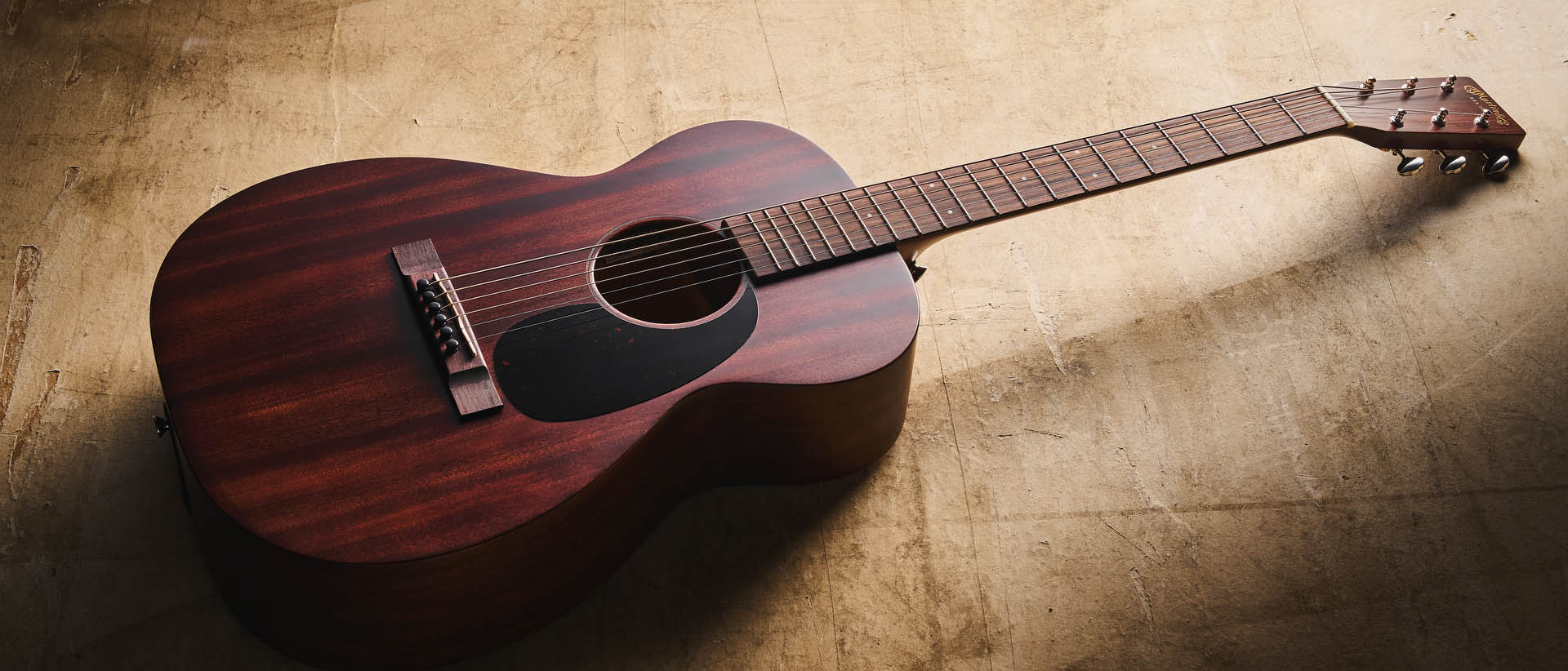Madi Diaz: "My Harmony Meteor kicks the s**t out of everything. I know I'm gonna be able to hold my own because this guitar, it's just got me"
The Nashville songwriter and guitarist on how documenting a bitter heartbreak with a Harmony Meteor was the making of her cathartic new album, History of a Feeling

Great songwriters all have a tipping point – somewhere beyond the writing exercises, woodshedding and weeping over YouTube comments – when they somehow figure out how to tap into something deep and genuine.
Nashville’s Madi Diaz has been good for a long time. She studied at Berklee, has a long list of brilliant friends and has spent four albums and countless collaborations experimenting with everything from noise rock to synth pop. However, it’s her latest record, History Of A Feeling, that feels like something special.
The album was inspired by the brutal breakup of an important relationship, one further complicated by the fact that her former partner was transitioning at the time. Diaz fed these messy, complex feelings – anger, self-pity, anxiety, resentment – into her guitar. In return, it poured out the songs that would become History of a Feeling.
It’s a glorious, gut-punching listen, full of poisonous little details, exorcised across her rumbling electric. It’s the stuff that most of us can’t write, or at least not in a way that anyone would want to listen to. It is exactly the right side of self-indulgent but still self-aware: the sound of a songwriter taking a real chance.
As Diaz puts it: “Some people are gonna like this record and some people are not gonna like this record. But my 'give a fuck' level is dwindling. It’s at an all-time low…”
There's been a big time gap between your last two albums. Why do you think it took so long for this material to come together?
“Well, I think a couple of reasons. It’s totally bizarre that it’s been seven years! I was playing with a couple of different bands, and kind of seeing what fit. I was writing for other people and writing music for film and TV, and seeing where my place was in the world. I did want to write a record, that was always the goal. But I think I just didn't have my words together yet…
All the latest guitar news, interviews, lessons, reviews, deals and more, direct to your inbox!
“I knew that I had to keep flexing some sort of muscle and, you know, at this point, I'm also just like, ‘What else do I do?’ I'm a pretty bad bartender. There was a moment where I was definitely investigating equine massage therapy as some sort of fallback plan! At some point, you just kind of have to commit to not having a fallback plan and let music be the thing.”
What brought you back to Nashville from LA?
“I was just going wherever music stuff would take me and Nashville has always been a place of rest and growth. It's challenging here, in a lyrical sort of way, and it felt so seamless to come back to Nashville and really start to carve out what I was doing.
Songs were just pouring out. I probably wrote around 100 or more songs for this record
“Songs were just kind of pouring out at that point. I probably wrote around 100 or more songs for this record, just to get it out as much as I could and find where the storyline was. It was easier to do here than anywhere else I had lived.
“So maybe that had some sort of an effect on it, you know, or maybe it was my living in LA that had some sort of effect on me not focusing on myself for that five-year period until I moved back to Nashville.”

History of a Feeling documents the fallout of an important relationship in your life. What have you noticed about your relationship to the guitar and to songwriting during periods of personal struggle?
“It feels like it's the only thing to do. [Until that relationship ended] I hadn't lived by myself for a while and I moved into this one-bedroom apartment on the East Side of Nashville.
“I would set my amp up against the wall of my empty living room, and I have this Harmony Meteor that feels like the most important guitar to me, in a lot of ways. I would just play and not really have any solid thought. I'd play at like four o'clock in the morning or two o'clock in the morning or 11 o'clock at night – I have great neighbors, thank God! [laughs]
Playing the guitar just felt like a sonic hug
“I’d light all the candles in my room and I'd turn off all the lights and just play. I wasn't even thinking of it as soothing, but I guess that's what it had to be. It just felt like a sonic hug, you know? It was kind of the only thing that felt like it would draw out the poison in the way that I needed it to.”
You’ve mentioned the term ‘self-pity’ in regard to the writing, which is a hard thing to channel in a song – that line between being honest but not self-indulgent. What’s the secret to dealing with self-pity in songwriting?
“I mean, it's one of the reasons why it probably took 100 songs, because no-one wants to listen to somebody whine – and there were definitely plenty of songs that were pretty whiny! I don't have time for that shit, either. You've got to get that stuff out of your system.
“Then there's a love and an empathy for the thing that I went through with the person – or rather, without – and I was really just wanting to step out of that, and not be so inside of the grief. To step out of my body for a second and be like, 'What are you feeling? How are you feeling? How did you get here?
“'How do we capture that moment where you're crying in the parking lot of the grocery store, and then you have to figure out how to get the tow truck to pick up the truck, and then we're gonna get home and get on with our lives?’
“It’s about how you find the ground between capturing the moment and knowing that the moment isn't going to last forever.”
Writing about real events, it seems it’s often easy to wind up being too general, or making allusions to things rather than, as you say, documenting that moment.
“Totally. I think it's like talking to a friend and being like, 'Hey, this fucked-up thing is happening right now.' It has to be conversational. Like, on a level, I haven't slept all night, I'm drinking a cup of coffee and one of my friends walks in, and is just like, 'What's going on with you?'
“And we're just getting into it and trying to get to the meat of the thing and just relating, you know what I mean? Maybe that's the key: just making sure that it's being said in a way that I could receive it from a friend of mine.”
You road-tested a lot of this material over time in regular performances around Nashville. What did you learn to look for in those shows?
“I really made sure that it felt like it was mine. It's funny, when I'm playing a song that doesn't feel like mine onstage in front of people, I tend to not stick around [mentally]. My body is there and I'm playing the song, but I'm thinking about other shit. Weirdly, I noticed every time I played Crying In Public or Resentment, or certain songs, I felt like I was just in my body the whole time from start to finish and it felt fluid.
“So, I really did my best to pay attention to when I was feeling like I was trying to get out of there. You know that feeling when you're like, [sings] 'When is the song that I'm playing gonna be over?' I don't want to feel like that, ever. Where it's like, 'Shit, I wrote this song. I don't want to be [watching the clock] while I'm trying to get other people psyched,' you know what I mean?”

You mentioned your Harmony Meteor. How did you come by it? And was that used on the record a lot, too?
“Yeah, I think that was basically the only electric that we used. It's this '59 Harmony Meteor that I found – can you believe it – at freaking Guitar Center in Nashville. This was probably… God, how old am I? I think I was 23. So it was like 12 years ago and it was like 850 bucks and just hanging on this wall.
“At that point, every time any of my dude friends were starting to nerd out on gear, I would just roll my eyes and be like, 'Ugh. Yeah. I'll meet you in the car...' But I found this guitar and I sat down and I was just like, ‘Oh my god!’ I fell in love with it, like a weird deep love, but still didn't buy it. Then I left and went to rehearsal and I just kept thinking about it.
“My guitar player at that point was also my writing partner and really close friend, Kyle Ryan, who's been Kacey Musgraves' MD for years and years. He looked at me and was like, 'You're thinking about that Harmony, aren't you?' And I was like, 'I am thinking about that Harmony!' He was like, 'Dude, we should go get it. We should go get it right now.'
“So we all left rehearsal and went to Guitar Center while I got this guitar. And they were all psyched that this was the first 'gear moment' that I was having, you know? They felt like, 'Ha! We got her!’”
There are some really lovely electric tones on the record, particularly the rumbling, crunchy sounds on Think Of Me and Woman In My Heart. How did you get those?
“I was using a Fulltone Full-Drive for the drive and then I think we put a [Electro-Harmonix] Holy Grail reverb on it and just ran it through a little Fender tube amp. We were recording in this really bizarre studio space downtown.
“[My producer Andrew] Sarlo had a friend who had this space downtown, and this guy just had the most bizarre amount of gear that I've ever seen. There were times where I was just like, 'I don't even know what this is running through.' Sarlo was like a kid in a candy store. At one point, he set up like 10 vocal mics in a line and had me singing in front of each one.”
Is that a baritone on Think Of Me? It sounds really deep…
“No, it's funny. Part of the magic of that Harmony guitar is that it is just so full on its own. I have 0.12s on right now and I don't even tune it down. It's just normal-ass-tuning and it has these beautiful harmonics and these beautiful overtones.
“The body of it is so cool, too. It just looks like someone sawed it out of a hardwood gymnasium floor and just blasted it on to a guitar. It’s got such a great tone. It’s not too fancy, but definitely has some flair and this warmth and this bite at the same time.
I know that this sounds ridiculous, but that guitar just makes it so I'm not nervous
“I have a couple of different guitars that I love. I have this Gibson Melody Maker that's also a '59. That's sort of similar in that it has that same warmth, that same bite, but it doesn’t have that bottom roundness or fullness that the Harmony does.
“There's just something about the Harmony that kicks the shit out of everything. It just makes me feel like I can actually hold my own, even as a solo show. I know that this sounds ridiculous, but that guitar just makes it so I'm not nervous. I know that I'm gonna be able to hold my own because this guitar, it's just got me, and it's like almost the whole band by itself.”
There’s some really nice acoustic playing on this record, too, particularly Crying In Public. What were you using on that?
“I want to say I was using a Martin. I have this D-28 that I love so much that my dad actually bought for me, brand new, when I was in my first year of college at Berklee. He got it for me as a graduation/'you're gonna have to play this all the time because you decided to go to music school' present.
“It’s aged really well, too. My friend Charlie Worsham, who's this totally virtuoso guitar player here in Nashville – one of the guys that makes me think, ‘Do I know how to play guitar?' – has this D-28 from the '70s and the second that I played it back then I was like, ‘Goddamn! This just is so open…’
“So it's been so cool to experience my Martin getting older because at this point its almost 20 years old… Fuck. Yeah. My Martin's almost drinking age, man."
How do you feel about History Of A Feeling going out into the world, given it documents a very painful period of your life?
“You know, when I put out the first single Man In Me, which is arguably the most personal, detailed song on the record, I was having a minor panic attack. I couldn't figure out why because I was just like, 'Dude, I release music all the time! I don't understand why this would be such a terrifying feeling.’
“And my friend – who's an artist in town, Fancy Hagood – was like, 'Well, Madi, I don't know if you've ever released anything so personal.’ And I was just like, ‘Oh, shit, he's fully right!’
“But, you know, once I got through that first song people responded, and when I put out New Person Old Place, people were hitting me up and being like, ‘Thank you so much for this song. Like, I really needed to hear it right now, this is happening in my life...'
I've just been grateful to have the opportunity for this record to do something positive. It was a really beautiful experience and painful for me to write it on a lot of levels
“So I've just been grateful to have the opportunity for this record to do something positive. It was a really beautiful experience and painful for me to write it on a lot of levels. It's wonderful to share something and then feel the weirdly positive effect ricocheting back to me.”
- History of a Feeling is out now via ANTI- Records.

Matt is Deputy Editor for GuitarWorld.com. Before that he spent 10 years as a freelance music journalist, interviewing artists for the likes of Total Guitar, Guitarist, Guitar World, MusicRadar, NME.com, DJ Mag and Electronic Sound. In 2020, he launched CreativeMoney.co.uk, which aims to share the ideas that make creative lifestyles more sustainable. He plays guitar, but should not be allowed near your delay pedals.
